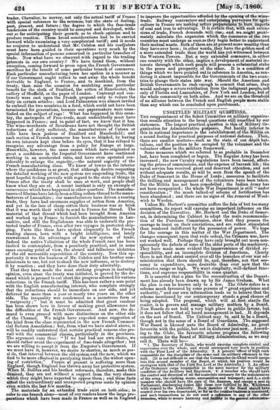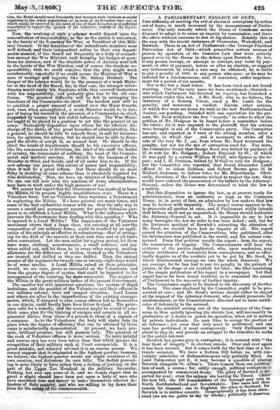UNSETTLED MILITARI( QUOTIO/sl i g, Tax reappointment of the Select COMMittee on
military, organiza- tion recalls attention to the broad questions still unsettled by our statesmen. The largest practical question is this of Military Or- ganization for Administrative purposes. But hardly inferior to this in national importance is the establishment of the. Militia,on a sound footing for practical purposes of national defence. Then, there are smaller matters—such as the state of our. dCp0t, bat- .talione, and the position to be occupied by the volunteer and, the volunteer officer in the. military, .framework..
Some measures which we referred to asprobable in December
last, have been completed or begun. The Regular, Army has been increased ; the new CaValry regulations have been issued, affect, ing the prices of commissions, and the expense of barrack life; the naval service has received great and deserved attention,- and not without adequate results, as will be seen from the speech of the Duke of Somerset in the House of Lords ; measures, to facilitate the drilling and management of the volunteers have been taken. But the Militia has not been remodelled ; the Indian Army has not been reorganized ; the whole War Department is still " under consideration ;." the much talked-of scheme of fortification has been abandoned and there are no-signs of the removal of Wool,
wich to Weedon. . Unless Mr. Herbert's committee ,suffers the fate of but too many
committees, its report will evergiae an important influence on the decision of the Executive. • Mr. Herbert and the Duke of Somer- set, in determining the Cabinet to adopt the main recommenda, tion of the Purchase Cominiseion, show that they possess the courage to insist on their convictions, and are rather stimulated than rendered indifferent by the possession of power. We hope for like courage in this matter of the War Department. The changes conseq.uent upon that rude ordeal, the ,Crimean war, have not worked well. Perhaps they have only brought out more con- spicuously the defects of some of the older parts of the machinery, They have made, more evident the inconvenience of .divided re- sponsibility, and an incomplete division of functions, Clearly there is not that strict control over all the branches of our war ad- ministration that there should be, and, therefore, net that eco- nomy in expenditure, more desirable than ever now that the estimates range so high. We want simplicity, Well-defined func- tions, and supreme responsibility in some quarter.
i It is asserted that a plan for the reconstruction of the Depart-
ment has already been drawn. up by Sir James Graham. What the plan is can be known only to a few. The" Globe refers to a scheme much favoured by some persons of " great experience and authority," and our own information leads us' to.believe that the scheme mentioned by our, contemporary stands a good chance of being adopted. The proposal, which will at Rrst startle the reader, is to govern and manage, military matters by a Board. Now Boards do not hold a very high place in public favour, but it does not follow that all board management is bad. It depends on the sort of Board., The Cabinet may be said to be a Board, though not in the sense of a Board of Guardians. The supposed War Board is likened unto the- Board of Admiralty, no .great favourite with the public, but not disfavour just now. Accord- ing to the Glebe, the favciurite scheme proposes the following constitution for the Board of MilitOrY Administration, as we may call it. There will be- " 1. The Secretary of State, who would exercise complete control and supervision over the whole, and Would' eorreisponft Very- much in position with the ,First Lord of the -Admiralty. 2. A geriafil officer of high rank responsible for the discipline'of the array:and its-military efficiency in the field. (It is not difficult to see that the -Commander-in-Chief would merge into this second member of the Board, at which his position would be analogous With" that of the First Sea Lord at the :Admiralty.) 3. An officer of the Ordnanee corps responsible in the same' manner for the military conditicin of 'the:Artillery -eta Engineers. 4: A member who 'should have the control'and directiorfof -all the-materials necessary for the 'Maintenance of the army, the clothing : stones, ammunition and tranaportt: and 6; a civil member who should' have the, eare of the finances, and-occupy a seat in Parliament, discharging duties like those now fulfilled by Mr. 'Whitbread with respect to'the Admiralty. Each member of the Board should have control over his own department, so far as the routine business is concerned, and such transactions as do not need a reference to any of the other branches, while to secure harmony and facility in the general administra-
tion, the- Braid aleinislaneetlreauentiOnal Patinae seek business stoplight
apper1sityl. i .* 11)100140eArattebesthan oae,,9F which pg144 wi 4 , wallies as of Eafficient mere, ,..lop, w thl J IS 310:, at .6 ,t11116,117.4 (), .1:• of 1-4°. 4e.l'art.
...
portioiert • A' 'On! ox , Now, trit4idrival4kiiirofillibliElliffseixeiiitilitotkal4:14petal4fion the concentrAlcaroftiehphilii0illityLlsoolitelifiztlie4iiatitifil iff'tqincernek in the 'halide of theldeititiftyfiii`;'': of rri,eitTeiii4futhitr-Mili- tary Connell: 'ItififfilialtItifin0fi'die . '4Vittiniteffidittheif,itere Well defined;luntitliiirliiid4eridellif N '''s 4'-in 'theirlWirit7elepiirt= smut* seearettlifittlel.Board -Sato Ae-fitly as a becifortothisel-; lor*arotind--theyWit Minister, each ifreng his -bidget4f ques- tions for deciiion; and if the abseliite power of decision'. left in the hands:of-the War Minister, and of course the abedubiere- sponsibility, thtli 4e cetticl conceive that the plan *reit 'Wink satieftietorily;`*ipeeldly-if we Conid secure .for -Minfiter'erWar'* man of tOuf:kgiPitiat sagacity Bliel.-Mr. Sidney Heil** The danger Of-filiefeclitelAdirektid liCInlhe presence of &Weak Minia-' ter at the lietid,iit i4..., for;'in'thitt case, the stfonter iiilior dinates Weiiild4kiiiii -1 7,,filii4i0itii*liee they covered theatielves with his *A- Ii' t', rise to the old con- fusion. The lierififeaffffflcultypWill lie felt in arranging the functions of the Vdninii' sAidi er.4inzeiiief.7 The hardest task will be to establish a prepeiliiiihiloinit of -eon-trot over -the -florae Gitardsi and, even when aceo 414 kAhed, a .-weak, Minister would be in dan- ger of losing' his Centre in the-presence of a Commander-in-chief„ 1111PPortla fIX itnajOifiiiit' iot Unfelt influences. The ' War Minis= :r tevouglit-to jyttiti Ili' a position to act like -thegeneral of 'an army-'Neeesatir ' Rtlidident 'upon others -for the efficient dis- chaigeoffhe chi ' gig 'the great branches of administration, like a general; he should be able to consult them, to call for informa- tion, for opinions,. for advice' but he should also be able to disre- gard the tuliteeor-accept it, as- seemed'best. He should be the chief; the hetiiiii'6f departments should be his executive • officers, like the commanders ofilivisione; the chief of the staff- the-ballet of cavalry, the eonim&ncleir,Of artillery,' the head of the Cointhis- sariat and medical 401'45,1E:Y1:6 ft should be the bUsineas of the Minister to think and dedicl4and of all under hini, to do. If the new scheme can secure -tt4 ektent of power and -responsibility; then it will be a great 'reform. But there -should be no more delay in deciding on some scheme theri is absolutely required for wise deliberatitin,'--Now, we have an interial of breathing time. No one can toltiriii` soon the machine of- Arniy adMinistration may have to workunder the high pressure of war. We cannot but regret that the Government IMS resolved to leave the Militia in its present highly unsatisfactory State. There is a Volunteer force, but no Volunteer -force warrants a Government in neglectin04the Militia. We have pointed out many times, and some of the'beit authorities concur with us; that the only way to secure a soinid'and permanent reserve for purely defensive pur- poses is to establisha total Militia. .Whittis the infinence-sviiich prevents-the Government from dealing with this question? -Who ' is opposed to a Local -Militia? - The experience of the-Volunteer movement shows 'that a large class; not entering at all into-the composition of our military forces, could be- reached by an appli cation of the principle so effectiVe in volUnteering—that of arrang- ing for the drill of the recruits at their own time and at all times when convenient. -Let the men enlist for a given period, let them have- arms, clothing; - accoutrements, a Small retainer, --and pay when galled out, and let them be in every other respect, making allowance for the difference of station, _treated as the Volunteers are treated,' and drilledus they; are drilled. Then the, annual muster of the regimeritfer twenty-one or twenty-eight days would' be of some service. A Load Militia raised on these principles, would,. we are cure, prove as successful as the Volunteers; and from the greater degtee of system that could be imparted to the management of the training, far more successful. The neglect of the Militia is the great military ladies of the present Government. The smaller but still important qiestionS, the system of 'depot battalions, and the position of the Voltinteers and their officers in Our military scheme,-hare not escaped -attention. Lord Luean and others are alive to. the! imperfections Of the_ eicisting arrange- ments; whith, if designed to ruin young _officers left to themselves in our depots, could hardly have been better devised. The grier-. once calls for a remedy; and the occasion might be seized to esta= Wish some plan far the training of ensigns and cornets in all re- gimental duties, from those of a private' to those of a captain of a company. As to the Volunteers, the body will shake into its place when-the degree of efficiency that eau be attained by these eorps.ia satisfactorily demonstrated. At present, we have pro- mise; brilliant promise, but still promise only. The question of the rank of Volunteer officers- is'intire serious. No more painful and unwise step has ever been taken than' that which ignores-the recognition oftheir military rank at Court ceremonials. It is a great mistake, "and whoeret advised it is an unwise person. We cannot suppose thatit originated in the higheat.quarter; because, we believe-34th° highest quartet would' not slight creatures of its own creation; and dishialettr its' own billi. The foolish proceed- ing is more likely to lifritniiiiefi from a feeling of jealousy on the psart of the Upper Tait, Itunileteil in the military hierarchy. Nothing but evil can .eoraeltilit, and we deeply regret .that so great it slight should havee,been put upon a body-of men who have sacrificed time and relinePti'i- make themselves efficient de, fenders of their country, and Who. ire willing to ,lay down their lives for the safety of the commonwealth.



























 Previous page
Previous page